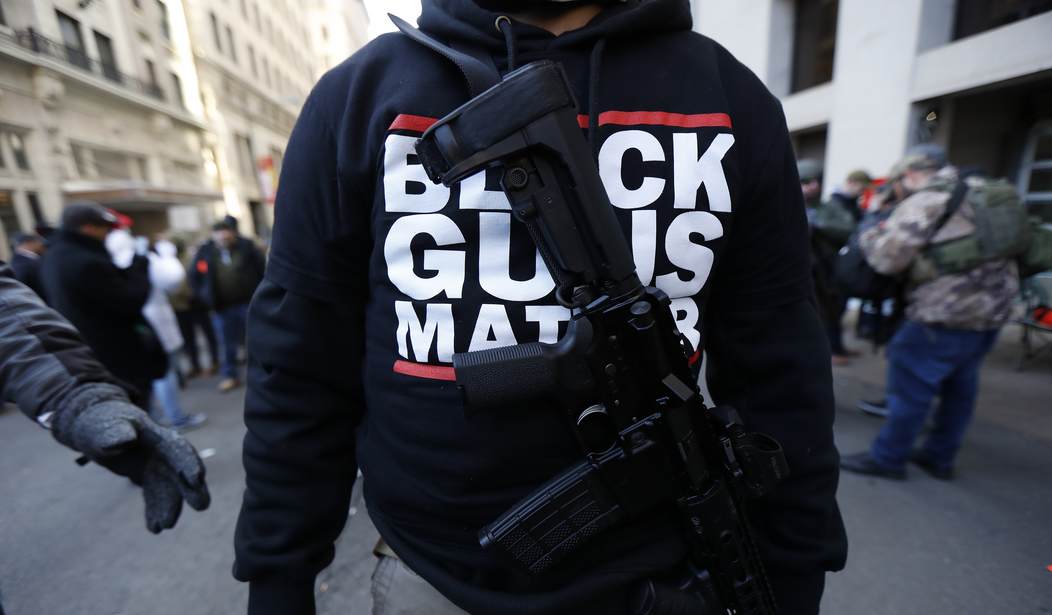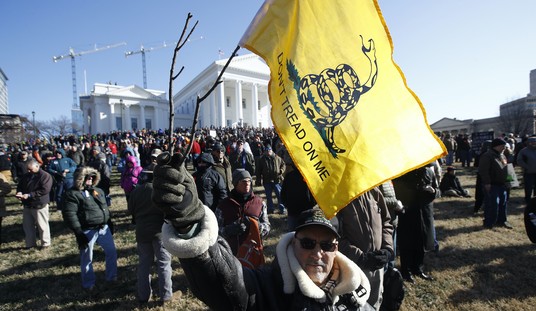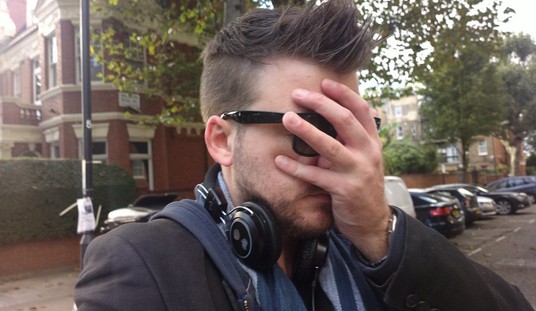President Joe Biden is heading to Tulsa, Oklahoma today to help commemorate the 100th anniversary of the Tulsa Massacre; a two-day orgy of violence that erupted on May 31st, 1921 after a black man named Dick Rowland was accused of inappropriately touching the arm of a woman after he stepped on her foot in an elevator. The woman declined to press charges and the case was dropped, but when a mob of armed White citizens clashed with a group of armed Black citizens intent on protecting Rowland from the lynch mob, the fighting raged for days, left hundreds of Tulsans injured, an unknown number of people killed, and large swaths of city’s black neighborhoods burned to ashes.
While Biden isn’t going to be touting armed self-defense in his speech in Tulsa today, over the weekend hundreds of people turned out in the city for what was billed as the “Tulsa Massacre Second Amendment March,” with attendees honoring those armed citizens who tried to protect Rowland 100 years ago and proclaiming their own right to keep and bear arms in self-defense.
“To commemorate the brave men who went to defend the imprisoned man that started this whole massacre,” march participant Toni Frank said. “They stood up and somebody has to commemorate them (sic) 100 years later and stand up with them.”
“It is different,” Tulsa resident Larnell Toles, who watched the march from his family’s home, said. “I ain’t ever seen anything like it. I have never seen anything like it before in my life and I am almost 50.”
When I wrote about the Tulsa Massacre a year ago, I pointed out that a number of academics proclaim that the violence in Tulsa a century ago was the byproduct of a racist Second Amendment, but the truth is that the Black residents of the city were justifiably proud of their willingness and ability to fight back when an armed mob rampaged through the black neighborhoods of Tulsa.
As Nicholas Johnson notes in his book Negroes and the Gun: The Black Tradition of Arms, in the wake of the Tulsa riots that destroyed much of the black part of town and left thousands of lives forever changed, something happened that sounds exceedingly strange to us today. Johnson quotes black historian John Hope Franklin, who moved to Tulsa as a child a few years after the riots and later “observed that the black community viewed the 1921 riot as a manifestation of their courage, and as a lesson about the proper response to racist aggression.” Tulsa’s black residents, according to Franklin, saw the riots as less of a story about black victimization, and instead viewed it as a heroic tale of standing up to oppression:
“The self-confidence of Tulsa’s Negroes soared, their businesses prospered, their institutions flourished, and they simply had no fear of whites. After 1921, an altercation in Tulsa between a white person and a black person was not a racial incident, even if there was a loss of life. It was just an incident. Such an attitude had a great deal to do with eradicating the fear that a Negro boy growing up in Tulsa might have felt in the years following the riot.”
The argument that the Second Amendment was racist in its origin and intent is alive and well today, with historian Carol Anderson asserting in a new book that the right to keep and bear arms was ultimately about keeping Black Americans disarmed. Like many academics, however, Anderson confuses the Second Amendment, which protects a right of “the People” to own and carry guns for self-defense, with gun control laws that have historically been used to disenfranchise disfavored Americans of their Second Amendment rights.
As Harvard professor Randall Kennedy wrote in a review of Anderson’s new book, the historian seems to find racist intent on both sides of the gun control debate:
In her portrayal, Blacks are racially victimized whether gun control is permitted (thus perhaps reducing the amount of gunfire unleashed on the streets) or whether gun control is restricted (thus perhaps giving ordinary folk more scope for self-defense). Anderson acknowledges the dilemma but offers no advice for moving beyond it. “This is not a pro-gun or anti-gun book,” she asserts. “Guns are not the key variable here. It’s Black people. … The Second Amendment is so inherently, structurally flawed, so based on Black exclusion and debasement, that … it can never be a pathway to civil and human rights for 47.5 million African-Americans.”
I believe Anderson’s premise has already been thoroughly repudiated; not only by scholars like Nicholas Johnson and civil rights activist Charles Cobb, whose firsthand account of the role of armed self-defense in the civil rights movement should be required reading for anyone interested in the individual right to keep and bear arms, but by the hundreds of men and women who marched in Tulsa this weekend, the thousands of Americans who’ve joined organizations like the National African American Gun Association over the past year, and the growing number of Black Americans who’ve embraced their right to keep and bear arms since the start of 2020.
There’s nothing inherently exclusionary about the Second Amendment. It’s the history of gun control that has deprived many Americans of their right to keep and bear arms, and it’s the ideology of the gun ban that is so inherently and structurally flawed that it can never be a pathway to public safety and civil rights. Those activists marching in Tulsa this past weekend understand that. Hopefully one day the academics like Anderson will be able to recognize how backwards their argument really is.








Join the conversation as a VIP Member